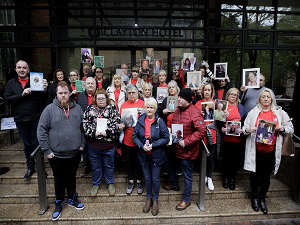
By David Young, PA
The police's failure to conduct an overarching examination of state collusion with a notorious loyalist murder gang in Northern Ireland was inconsistent with its human rights obligations, a judge has found.
The independent Historic Enquiries Team (HET) had partially completed a probe into the activities of the Glenanne gang before its work was halted by Police Service of Northern Ireland (PSNI) commanders.
Solicitor @darraghmackin says families who lost loved ones to Glenanne gang have been exonerated by judgment. pic.twitter.com/COrMjIeCte
— David Young (@DavidYoungPA) July 28, 2017
The HET had examined individual murders committed by the gang but had not undertaken an overarching thematic review of the collusion allegations.
The PSNI's decision to stop the HET review was challenged by way of judicial review by the family of one of the gang's victims.
The Glenanne gang was a unit of the Ulster Volunteer Force (UVF) that counted rogue security force personnel among its members.
Operating mostly in Tyrone and Armagh, the gang has been blamed for around 130 sectarian murders during the 1970s and 1980s.
The judicial review was taken by the family of Patrick Barnard, who was killed in a bomb blast in Dungannon in 1976.
Delivering judgment at Belfast High Court, Judge Seamus Treacy found that changes made by the PSNI to how it investigated historic cases were "fundamentally inconsistent" with its obligations in the European Convention on Human Rights.
He also questioned the state's commitment to investigating cases that involved alleged collusion.
He was particularly critical of decisions taken by former PSNI chief constable Sir Matt Baggott.


 Teenage girl killed in road crash named as Kamile Vaicikonyte
Teenage girl killed in road crash named as Kamile Vaicikonyte
 Covid-19 inquiry ‘an opportunity for candour’ from Stormont leaders
Covid-19 inquiry ‘an opportunity for candour’ from Stormont leaders
 UK and Irish ministers to meet amid row over migration
UK and Irish ministers to meet amid row over migration
 Three men set to go on trial for murder of journalist Lyra McKee
Three men set to go on trial for murder of journalist Lyra McKee
 Swann refuses to rule out resigning if budget is not changed
Swann refuses to rule out resigning if budget is not changed